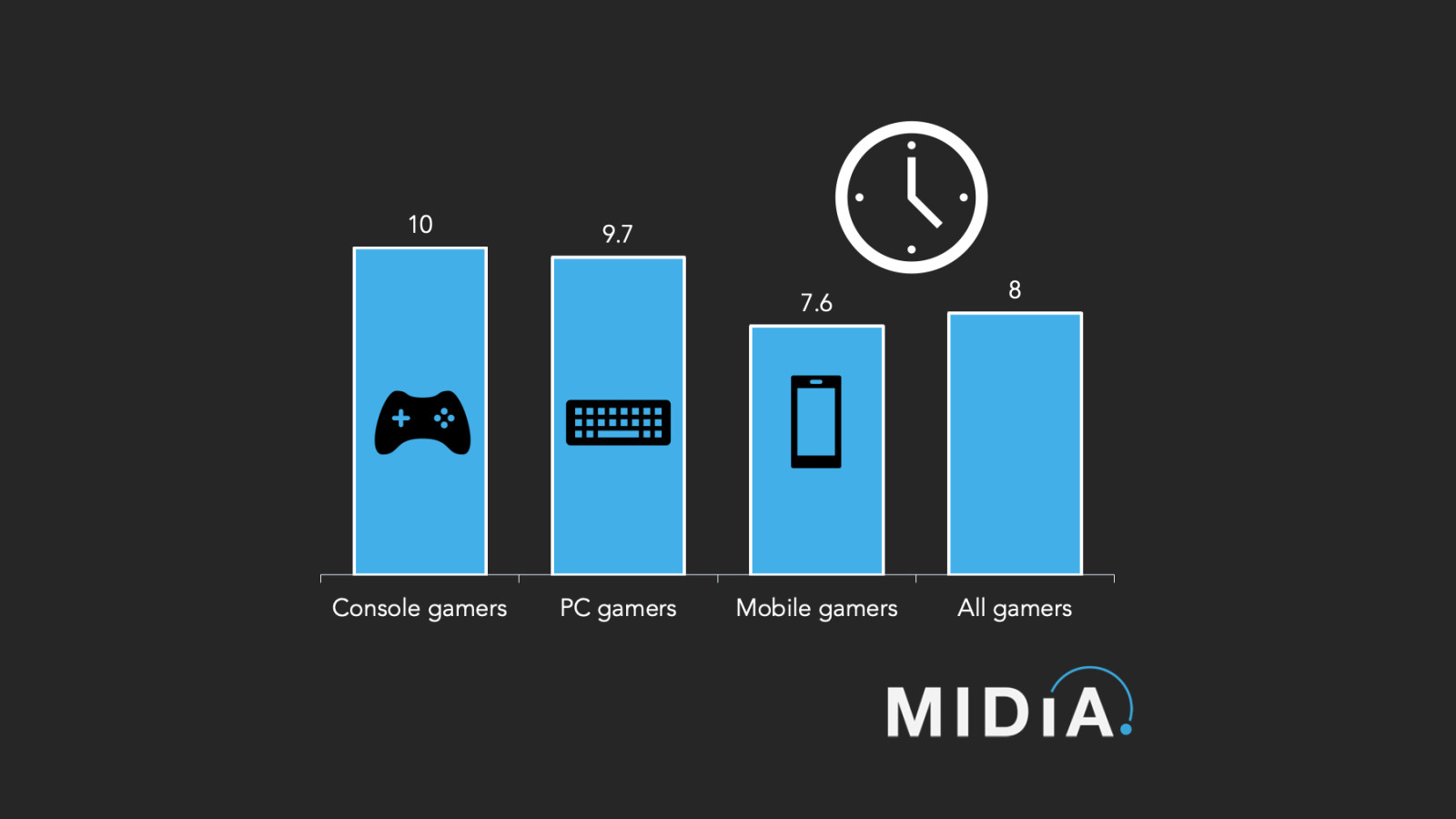The case for more digestable games: Over a third of console and PC gamers play LESS than 5 hours a week


The attention economy is oversaturated. Games are not just competing with other games but with TikTok, YouTube, Netflix, and well ... life.
But the games industry – especially premium games on console and PC – has a unique twofold challenge:
- Supply: New AAA games can take five years or more to make (and often have budgets in the hundreds of millions)
- Demand: Player attention and play time are already maxed out
MIDiA’s consumer research for Q4 2024 underlines just how little time consumers have to play. Console gamers spend – on average – 10 hours gaming per week, while PC players spend a little less (9.7 hours).
Naturally, averages only tell part of the story. Diving deeper into our data, we found that:
- Two-thirds of PC and console gamers spend less than 10 hours a week gaming
- 36% of console gamers spend less than 5 hours a week gaming
- And 40% of PC gamers spend less than 5 hours a week gaming
Did you know that we survey gamers every quarter? Reach out to learn more.
Games are different to other media – they demand more of consumers’ time
Five hours of gaming time a week is not enough to get stuck into a meaty 100-hour RPG. It's barely enough time to get through the character creator for some players.
As we mentioned in our global games forecasts towards 2031, limited gaming time is one of the reasons for the stagnating user uptake of Game Pass and PlayStation Plus higher tiers.
Players simply do not have time to play all the games these services offer.
Most games are not as digestible as movies, TV episodes, or albums. They demand more time and attention from players.
Gaming is also a more active passtime. A consumer can scroll through TikTok when engaging with more passive at-home media like music, TV, and film. Not with games.
What's more, Some demand several dozen hours just to get through the story.
‘’Game length has been "an insidious creep over time," as we told BBC in a recent interview. "Games got bigger each year, and then, compounded over 10 years it has been an insane jump in game length."
Featured Report
Podcasts as a key information source Implications for media companies
Podcasts have begun to rival traditional media as a key source of news and political information for podcast listeners, especially among millennials and Gen Z. To stay relevant, traditional media must...
Find out more…It does not need to be that way.
Shorter games are a more sustainable way forward
Cutting down on bloat makes game development more sustainable and can make games more digestible for ever-busy gamers.
Some of our 2024 research highlighted the negative correlation between game length and completion (easily viewable in trophy and achievement data).
Obviously, the longer the game, the shorter the completion rate. But huge shares of players are not seeing games through to the credits. Logically, such players would be less likely to pick up the sequel.
Would players even notice if developers cut game lengths for titles like Assassin’s Creed by 20%? Probably not.
And even if they did notice, shorter games can even be a selling point for time-strapped gamers who want a full experience but do not want to slog through 10 hours of filler content.
After all, gamers are playing long into adulthood these days, when career goals, families and kids, and social obligations get in the way.
Another way forward here is giving players more choice around how they play a game. The Obsidian RPG from Xbox, Avowed, gives players a choice. They can either blast through the story in 15 hours or absorb the game and all its content in 40-plus hours.
"I've definitely heard a sentiment on many of our teams, and from our player base, of: 'Oh, good! A game I can actually finish,'" said Avowed game director Carrie Patel in a BBC interview.
We expect to see other game developers experimenting with this more choice-based approach to game completion as the market adapts to gamers’ shifting – and differing – needs.
Later this year, we're publishing a report on the growing segment of ever-busy parent gamers. Reach out here to get your copy first.
The games market’s growth potential is slowing down, so are shorter games are a two-birds-one-stone solution?
All this is happening at a time when the games market is mature. There is no more double-digit growth coming.
Want to learn more about where the games market is going? Download this free report.
The reality in this mature games market is that profitability is vital. While mass firings have long been the de-facto way to balance the books, this is counter-intuitive to a healthy business.
It uproots people’s lives, pushes the talent that creates value in the industry away, and destroys institutional knowledge that makes companies like Nintendo, Obsidian, and FromSoftware so great (and profitable).
Just to hammer the point home on a more sustainable way forward:
- AAA development timelines are very long
- Budgets have grown to unsustainable, risky highs
- Player free time is maximised
- Most players are not even making it to the end of their games
Shorter games seem like a two-birds-one-stone kind of solution here for many developers.
Of course, big 100-hour-plus RPGs and expensive big-budget games should exist. But not every game needs to be that – just like every Hollywood movie does not need the same budget and scope as a flagship Marvel Cinematic Universe movie.
Our recommendation: less waste, less trend-chasing, more innovation, and more data-backed segmentation. The market cannot keep catering to the same gamers in the same way and expect the pie – and engagement – to grow.

There are comments on this post join the discussion.